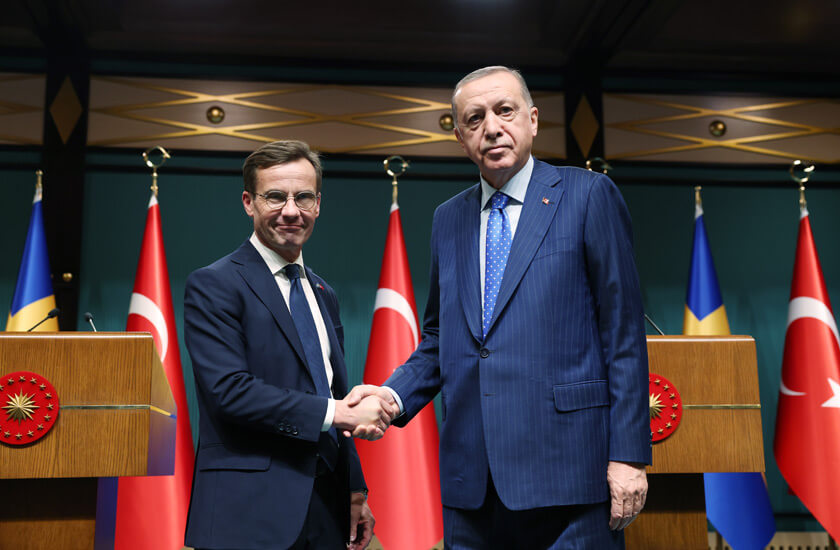Newly-appointed Swedish Prime Minister (PM) Ulf Kristersson on Monday assured Turkish President Recep Tayyip Erdoğan that his country would counter threats posed by Kurdish militants as Stockholm seeks Ankara’s approval to join the North Atlantic Treaty Organization (NATO).
“My government was elected just a few weeks ago on a mandate to put law and order first,” Kristersson said during a joint press conference with Erdoğan in Ankara. “And this includes countering terrorism and terrorist organisations like the PKK [Kurdistan Worker’s Party] in Sweden,” he noted.
“This is why I want to reassure all Turks: Sweden will live up to all the obligations made to Turkey in countering the terrorist threat before becoming a member of NATO and as a future ally.”
He said Sweden wishes to join NATO to boost its own security but also be a “security provider for others.” Keeping this in mind, he remarked, “Turkey has very legitimate demands on every new NATO member to be a true security provider also for the other allies.”
the press conference held by Swedish PM Ulf Kristersson and Turkish President Recep Tayyip Erdogan confirms what most of us already knew, Turkey will not ratify Swedish membership until Sweden gives him "a body," i.e. extradites at least one of Gulenist to Turkey.
— Amberin Zaman (@amberinzaman) November 8, 2022
In May, Ankara blocked Sweden and Finland’s bids to join NATO, saying they supported terrorists by harbouring Kurdish militants belonging to the Kurdistan Worker’s Party (PKK) and the People’s Protection Units (YPG). Furthermore, Turkey said it would not approve their bids unless both countries lifted an arms embargo on the Turkish military over their invasion of Syria.
Last week, Turkish Foreign Minister Mevlüt Çavuşoğlu noted that while both Stockholm and Helsinki made progress in the front of removing arms embargoes, they have not fulfilled their obligations to extradite “terrorists.” Likewise, Turkish parliament speaker Mustafa Sentop said Sweden still has “many steps to take” in the path to NATO membership.
Against this backdrop, Erdoğan welcomed Kristersson’s statement but said he wants to see “concrete steps” in the coming days. “One of the most fundamental elements of NATO […] is full solidarity and cooperation in combatting terror in all its forms and manifestations,” he underscored.
İsveç Başbakanı Ulf Kristersson'u Resmî Karşılama Törenihttps://t.co/FQ0lhgcClI
— Recep Tayyip Erdoğan (@RTErdogan) November 8, 2022
Noting that he is pleased about the new Swedish government’s commitment to tackling terrorism, Erdoğan urged Kristersson to ensure that all Kurdish militant and other groups, including FETÖ (Fethullah Terrorist Organisation), are “prevented from exploiting the democratic environment in Sweden.” “It is our sincere expectation that Sweden becomes a NATO member after the Trilateral Memorandum is fully implemented as a whole, and thus adding the allyship aspect to our friendly relations dating back to centuries.”
In June, Sweden and Finland signed an agreement with Turkey vowing to stop supporting the PKK and the YPG and agreeing to extradite Kurdish militants to Turkey.
Erdoğan said, “Turkey has always been a strong supporter of NATO’s open door policy” and is willing to support Sweden’s bid in return for respecting Turkey’s security concerns. “Sweden wants NATO membership for its own security, and we expect Sweden to support us in addressing our own security concerns,” he stressed.
LIVE - Turkish President Erdogan receives Swedish Prime Minister Kristersson, who is paying an official visit to Türkiyehttps://t.co/ELQmP1MyNy
— ANADOLU AGENCY (@anadoluagency) November 8, 2022
Earlier this week, Swedish Foreign Minister Tobias Billström said his country needs to “distance” itself from Kurdish groups. “We think there are doubts and problems regarding those who are damaging our relationship with Turkey,” he told Sveriges Radio on Saturday.
Billström also called the PKK a “terrorist organisation,” saying Sweden should be concerned about other Kurdish militias like the YPG have “close links” with PKK.
Responding to his comments, the Syrian YPG demanded that Stockholm immediately repatriate Swedish citizens being held in Kurdish-controlled prison camps in northeast Syria. Thousands of foreign citizens have been detained in Syria for joining the Islamic State and fighting for them.
There is no reason why the YPG should take care of “Swedish terrorists,” Shiyar Ali, spokesperson for the Kurdish group, said on Monday. “Why should we do that when you distance yourself from an organisation that fights against terrorism and pays dearly?,” he asked.
Sama Bakdash, another YPG spokesperson, said “bowing to Turkish blackmail contradicts the principles and morals of Swedish society and the humanitarian attitudes that characterized Sweden”
LIVE: Türkiye’s President Erdogan and Sweden’s PM Kristersson hold joint presser in Ankara https://t.co/oGzKUpGtEv
— PresserWatch (@PresserWatch) November 8, 2022
Western countries and allies have supported Kurdish groups in Syria with weapons and money to help them fight ISIS and prevent its resurgence. However, Turkey regards the YPG as a terrorist organisation and an ally of the Iraq-based PKK. In this respect, Ankara has launched several offensives against Kurdish groups in both Iraq and Syria.
While Sweden has so far supported the YPG with arms supplies and issued an arms embargo against Turkey for invading Syria, it has been forced to reconsider its position following Russia’s invasion of Ukraine in February.
The Ukraine war pushed both Sweden and Finland to abandon their decades-old policy of not joining any military alliance and submit applications to join NATO. The two countries have expressed concerns over a potential Russian offensive against them, as their accession to NATO would double the Alliance’s land border with Russia and expand its eastward presence, something Russia has repeatedly objected to.
Sweden is home to around 100,000 Kurds, while Finland houses 15,000 Kurds.

